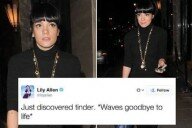What did your Valentine’s evening look like a few weeks back? A romantic candlelit dinner, or one lit by the glow of your iPhone as you swiped away on your Tinder app, impatiently awaiting matches to diversify the pool from which you’ll select your next hookup? There’s a growing sentiment amongst perplexed elders, traditionalists and social commentators – exacerbated by a recent deluge of panicky op-eds decrying so-called ‘hookup culture’ – that romance has been replaced by a new phenomenon of casual sex and hookups; that today’s youth have traded in flowers and chocolates for ’dick pics’ and swipe sessions on Tinder.
Gen Y’s matter-of-fact approach to relationships is a reflection of the society in which we were raised. Growing up with The O.C., Dolly sealed sections and Dr. Google to answer all our ‘unwholesome’ questions, Millennials are certainly more acquainted with the ‘technicalities’ of sex and, naturally, less strict than our predecessors. But do claims about the death of romance – a concept so seemingly timeless – ring true? Are we really a generation of emotionally stunted, romance-deprived, sex-fuelled zombies?
For better or worse, the advent of modern technologies and the decline of courtship and traditional dating have seen a transformation of the dominant approach to romantic relationships. The pervasiveness of ‘hookups’, or uncommitted sexual encounters, among emerging adults was demonstrated by a 2012 piece titled Sexual Hookup Culture: A Review, published by the American Psychological Association.
Tinder has been labeled the shallowest dating app ever, and yet its popularity is a testament to the fact that Millennials are increasingly turning to social media technologies to increase their hookup stakes.
The paper displays the findings of one of the most recent surveys of North American undergraduate students, which suggests that between 60% and 80% have had some sort of hookup experience. Casual sex with virtual strangers and ‘friends with benefits’ arrangements have substituted steady dating and long-term relationships as the norm, as teens and 20-somethings are steadily dispensing with the traditional date.
Forget banter at a table for two; Gen Y-style courtship is characterised by an endless exchange of suggestive emojis, a closet dedication to Facebook-stalking our crushes, and romantically ambiguous non-dates and group hangouts initiated by the seemingly-nonchalant-but-carefully-constructed “So, wanna hang out?” text. For many Gen Y’ers, the traditional one-on-one date seems to have become a foreign and outdated concept.
Social networking and online dating have contributed significantly to the reshaping of the singles landscape and cultural shifts in the mechanics of courtship. Yay-or-Nay ‘dating’ apps like Tinder – which can effectively be summarised as ‘swipe right if they’re hot, swipe left if they’re not’ – cater more to casual sex than anything else. They essentially enable us to ‘shop’ for prospective, anonymous sex candidates by scrolling through photos of horny strangers nearby.
Tinder has been labeled the shallowest dating app ever, and yet its popularity is a testament to the fact that Millennials are increasingly turning to social media technologies to increase their hookup stakes. Let’s face it: you didn’t swipe right because his post-workout selfie intellectually stimulated you, or because you’d mutually ‘liked’ the official Homeland page. It boils down to one’s picture being their only value. And the likelihood of getting wined, dined and romanced by your Romeo or Juliet through an app designed to pair up sex-starved singles based on their proximity to one another is – shockingly – low.
In one sample of 507 undergraduate students, on average, both men and women reported positive attitudes following a one-night stand. But the same study also revealed that, among the men and women surveyed, whilst expectations of a traditional romantic relationship with a person they’d hooked up with were low, 29 per cent of men and 42.9 per cent of women ideally wanted to be in a traditional romantic relationship.
The upside is that for many young people, hookup culture facilitates the attainment of precisely what they’re looking for: casual, no-strings-attached sexual encounters. Platforms like Tinder – and its gay and lesbian counterparts, Grindr and Brenda – serve as time and money saving channels through which like-minded people can mutually benefit each other, without the charade of dinner and a movie. Simply put, it allows them to cut to the chase.
But the straight-to-the-point approach evidently leaves something to be desired for a substantial minority of young people who are more romantically inclined or simply uninspired by the prospect of anonymous sex.
The downside to the overwhelming prevalence of casual flings and hookups, is that it appears to be stifling the pursuit of more meaningful forms of intimacy that fall outside of contemporary dating norms – that is, for those who desire it. Nonetheless, according to an article in Slate, the typical student acquires only two new sexual partners during university, which suggests that by and large, Gen Y’ers aren’t the rampantly promiscuous hedonists we’re frequently made out to be.
Hookup culture is not a myth, but it hasn’t yet fully pervaded. No-strings sex doesn’t appeal to everyone, nor must it. There are still some amongst us brazenly opting out and resisting the trend by embracing their inner romantic. To those who indulged their Valentines with cliché expressions of romance, I salute you. And to those who Tinder-ed, Grindr-ed or Brenda-d their nights away – there’s no shame in your game.


















4 Comments
[…] a chord with them. Although it seems contrary to popular opinion, when it comes at a cost. The boy is unaware that you dress properly and correctly for the purposes […]
[…] accept the match, the users are able to start chatting. While Tinder has been labelled the “shallowest dating app ever”[2], its simplicity and ease of use has widespread […]
[…] the first message did not get delivered and your phone gives you maximum exposure to it throughout the day to strike up a conversation […]
Can I simply just say what a relief to discover someone that truly understands what they are
talking about online. You actually know how to bring an issue to
light and make it important. A lot more people need to check this out and understand this side of the story.
It’s surprising you aren’t more popular because you certainly possess the gift.